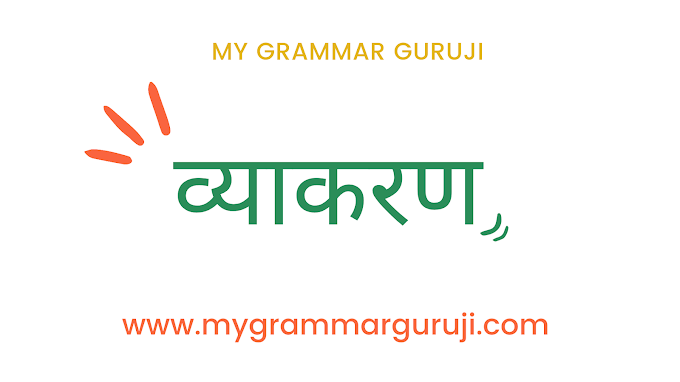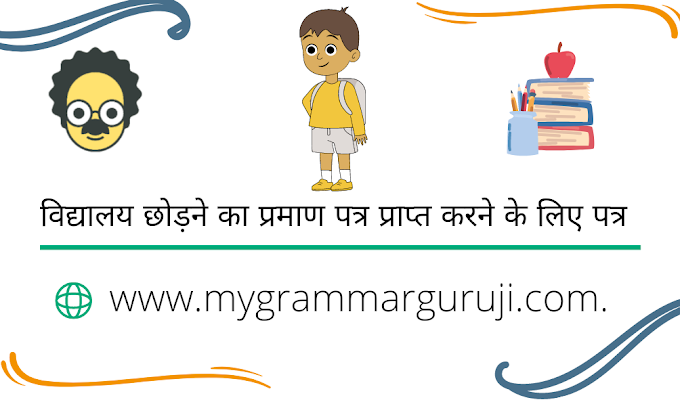NARRATION is derived from the word narrate which means to tell someone.
Or
The art of reporting the speech from a speaker's point of view is called narration.
TYPES OF NARRATION .
1. Direct speech or narration.
When we say from a person's point of view without making any changes as he/ she was saying.
(ज़ब हम किसी व्यक्ति की बात को बिना किसी बदलाव किए जैसा उसने कहाँ था वैसे ही कहते हैँ,)
पहचान : इस तरह के कथन को Inverted commas (") मे रखा जाता हैँ
Example :
She said to me "I shall play now"
उसने मुझसे कहा "मैं अब खेलूंगी"
2. Indirect speech or narration.
When we change someone's point of view and tell that thing to someone else.
(ज़ब हम किसी व्यक्ति की बात मे बदलाव करके किसी अन्य को वह बात बताते है,)
पहचान : इस तरह के कथन मे Inverted commas (") को हटाकर reporting verb और reporting speech के बीच that लगाया जाता हैँ
Example:
She told me that she would play then.
उसने मुझसे कहा कि वह तब खेलेगी
Points to remember.
1. Who is Reporter? What are the reporting verbs and reporting Speech?
- Reporter : a person who makes statements, as she.
- Reporting verb : That verbs conveying the action of speaking, as said to me.
- Reporting speech : In narration usually used to talk about the past, "I shall play now".

2. Changing Pronouns of reported speech.
Pronoun को SON के अनुसार बदला जाता हैँ,
If First Person (I, We) - according to the SUBJECT of the Reporting Speech.
If Second Person (You) - according to the OBJECT of the Reporting Speech.
If Third Person (He, She, They, Any name) - NO CHANGE.
 |
| Pronuns |
3. Changes in Tense while making indirect speech from direct.
 |
| Please! Tap to view clear |
4. Changes with adverbs.
 |
| Please! Tap to view clear |
5. Changes with Modals.
 |
| Tap to view clear |
6. Exceptional Rules.
I. If This, Here, and Now refer to an object, place, and time that is in front of or near the speaker, they will not be changed in Indirect Speech.
(यदि This, Here, और Now किसी ऐसी वस्तु, स्थान, और समय की ओर संकेत करते हैँ, जो कहने वाले के सामने या पास हो तो Indirect speech मे इन्हे नहीं बदला जायगा)
Examples
- He said "priya lived here".
- He said that priya had lived here.
- The stranger said "here I slept for five hours".
- The stranger said that here he had slept for five hours.
- She said to me "this is her pursue".
- She told me that this was her purse.
Note :-
If No object has been given after reporting verb, then there is no change in reporting verb.
अगर reporting verb के बाद कोई object नहीं दिया हो, तो reporting verb मे कोई परिवर्तन नहीं होता हैँ
II. If a universal truth or habitual fact is given in reported speech, then that reported speech is not converted into Indirect Speech.
यदि reported speech मे सार्वभौमिक सत्य या आदतन तथ्य दिया हो तो उस reported speech को Indirect Speech मे नहीं बदला जाता हैँ
Examples
- Our teacher said "we all live on the earth".
- Our teacher said that we all live on the earth.
- Ashok said to me "I write with my left hand".
- Ashok told me that he writes with his left hand.
III. If an imaginary condition is described in reported speech, there will be no change in its reported speech/ tense.
यदि reported speech मे किसी काल्पनिक स्थिति का वर्णन किया गया हो, तो reported speech/ tense मे कोई परिवर्तन नहीं होगा
Examples
- He said "If i were rich, I would help her".
- He said that If he was rich, he would help her.
IV. If a past historical fact is described in reported speech, there will be no change in its reported speech/ tense.
यदि reported speech मे किसी ऐतिहासिक तथ्य का वर्णन किया गया हो, तो reported speech/ tense मे कोई परिवर्तन नहीं होगा
Examples
- He said "Mr. Gandhi started the quit India movement".
- He said that Mr. Gandhi started the quit India movement.
V. If reported speech describes two actions occurring at the same time, then their Tense does not change.
यदि reported speech मे एक ही समय पर होने वाले दो actions का वर्णन किया गया हो तो उनके Tense मे कोई परिवर्तन नहीं होता हैँ
Examples :
- She said "My mother was cooking while I was playing".
- She said that her mother was cooking while she was playing.
VI. If past perfect (had) and past perfect continuous tense (had been) are used in Reported speech, then there is no change in Tense.
यदि Reported speech मे past perfect (had) और past perfect continuous tense (had been) का उपयोग किया गया हैँ तो तो Tense मे कोई परिवर्तन नहीं होता हैँ
Example
- She said to me " I had met him before the party.".
- She told me that She had met him before the party.
VII. If a magazine, newspaper, etc. uses we, our, us etc. for itself then in indirect narration they are changed to it, it's, and it.
यदि कोई magazine, newspaper, आदि अपने लिए we, our, us आदि का प्रयोग करता हैँ तो Indirect narration मे इन्हे it, it's, और it मे बदल दिया जाता है
Example :
- The hindu says " we are trying our best to keep you well informed".
- The hindu says " It is trying it's best to keep us well informed".
VIII. If object is not used in reporting verb and you are used in reporting speech, then this you is changed to third person or first person as per requirement.
यदि reporting verb मे object का प्रयोग नहीं हो तथा reporting speech मे you का प्रयोग हो तो इस you को आवश्यकता के अनुसार third person या first person मे बदल दिया जाता हैँ
Example :
- She said "you are guilty".
- She said that he was guilty.
- She said "you are guilty".
- She said that I was guilty.
- She said "you are all guilty"
- She said that we were all guilty.
7. Assertive sentence.
I. If No object has been given after reporting verb, then there is no change in it.
यदि reporting verb के बाद कोई object नहीं दे रखा हो तो इसमें कोई परिवर्तन नहीं होता हैँ
Example
- She says " I am in 10th class".
- She says that she is in 10the class".
II. If an object is given after the reporting verb, then the following changes take place in it.
यदि reporting verb के बाद कोई object दे रखा हो तो इसमें निम्नलिखित परिवर्तन होते हैँ
- Say - Tell
- Says - Tells
- Said - Told
Example
- He says to her " you have done your homework".
- He Tells her that she had done her homework.
Note :
According to the sentence said to can also be changed to the following.
वाक्य के अनुसार said to को निम्नलिखित मे भी बदला जा सकता हैँ
Explained, Informed, requested, replied, started, added, remarked, asserted, pleaded, assured, reminded, complained, reported etc.
III. Inverted commas (") को हटाने के लिए that लगाते हैँ
Examples
- Rama said to her mother " I am having a headache"
- Rama told her mother that he was having a headache.
- Ritu says to me "laughing is a good exercise".
- Ritu tells me that laughing is a good exercise".
- She said to me "I shall play now".
- She told me that she would play then.
- He said to her " The water boils at 100° Celsius".
- He told her that the water boils at 100° Celsius.
8. Interrogative sentence
I. Interrogative sentence has the function of asking question, so change the reposting verb said/ said to asked.
(Interrogative sentence मे प्रश्न पूछने का काम होता हैँ इसलिए repoting verb said/ said to को asked मे बदलते हैँ)
Note :
वाक्य के भाव के अनुसार said या said to को enquired या demanded मे भी बदला जाता है
II. If the question starts with a helping verb or modals, then remove the inverted commas (") and use If or Whether.
(यदि प्रश्न किसी helping verb या modals से शुरू हो तो Inverted commas (") को हटाकर If या whether का प्रयोग करते हैँ)
III. If the query starts with "wh" family then nothing is applied to remove the inverted commas.
(अगर प्रश्न "wh" family से शुरू हो तो Inverted commas को हटाने के लिए कुछ नहीं लगाया जाता हैँ)
IV. Helping Verbs :- Is, am, are, Do, Does, was, were, has, have, had.
Note :
If there is a helping verb in direct speech, then they are written after the subject while making indirect speech.
(Direct speech मे अगर helping verb हो तो Indirect speech बनाते समय उन्हें subject के बाद मे लिखा जाता हैँ)
Example
- They said to her " Are we wasting your time? "
- They asked her if they were wasting her time.
V. If the Interrogative sentence is positive and does/does have been given in it, then it is removed.
(यदि प्रश्नवाचक वाक्य positive हो और इसमें do/ does दे रखा हो तो इसे हटा देते हैँ)
Example
- He said to me "Do I sing a song now?"
- He asked me if he sang a song then.
VI. If the Interrogative sentence is negative then Do or Does changes to Did.
(अगर प्रश्नवाचक वाक्य negative हो तो Do या Does को Did मे बदलता हैँ,)
Examples
- She said to me "Do I not accept your proposal".
- She asked me if she did not accept my proposal.
- He said to them "Does she not serve her mother in law".
- He asked them if she did not serve mother in law.
VII. In Indirect speech, instead of sir or madam should be written with respectfully.
(Indirect speech मे sir या madam के स्थान पर respectfully लिखना चाहिए)
Example
- The student asked the teacher " May I come in sir ? "
- The student asked the teacher respectfully if he might come in.
VIII. In Indirect speech instead of Dear should be written affectionately.
(Indirect speech मे Dear के स्थान पर affectionately लिखना चाहिए)
Example
- Aman said to his brother "My dear, Did I not tell you a story?"
- Aman enquired to his brother affectionately if he had not told him a story".
9. Imperative sentence
I. Imperative sentence मे Order, command, request, advice आदि का भाव व्यक्त किया जाता हैँ इसलिए Repoting Verb said या said to को ordered, requested, advised, आदि मे बदलते हैँ
- Said to - Begged (क्षमा के लिए)
- Said to - Ordered / command (आदेश के लिए)
- Said to - Advised/ suggested (सलाह के लिए)
- Said to - Requested (प्रार्थना के लिए)
- Said to - Warned (चेतावनी के लिए)
- Said to - Forbade (मना करने के लिए)
II. To remove inverted commas, "to" is used.
(Inverted commas को हटाने के लिए "to" का प्रयोग करते है)
Examples
- I said to him "Go there".
- I ordered him to go there.
- The teacher said to boys "Don't make a noise".
- The teacher command the boys not to make a noise.
- I said to her "kindly give me a lift".
- I requested her to give me a lift.
- Father said to me "avoid bad company".
- Father suggested me to avoid bad company.
- I said to my son "Don't pluck flowers".
- I forbade my son to pluck flowers.
Note : forbid के साथ "not" का प्रयोग नहीं होता हैँ
- The convict said to the judge "please pardon me"
- The convict begged pardon to the judge.
- The general said to the soldiers "March forward and attack the foe".
- The general commanded the soldiers to March forward and attack the foe.
- She said to me "Do not go ffurther".
- She warned me not to go for further.
- "Sit down boys" said the teacher.
- The teacher ordered the boys to sit down.
Let Sentences
I. If "let" indicates instruction or suggestion, change "said" or "said to" to suggested/proposed and use that to remove inverted commas.
यदि "let" शिक्षा या सुझाव को प्रकट करें तो "said" या "said to" को suggested/ proposed मे बदलते हैँ और inverted commas को हटाने के लिए that का प्रयोग करते हैँ
Example
- She said to me "let us go to see a movie"
- She proposed me that we should go to see a movie.
Or
- She proposed to me to go to see a movie.
- He said to them "let us do our work sincerely".
- He suggested them that they should do their work sincerely.
Or
- He proposed to them to do their work sincerely.
10. Exclamatory sentence.
I. If the sentence express the feeling of happiness [Wah! Hurrah! Excellent! ] So said / said to change in Exclaimed with JOY.
यदि वाक्य खुशी का भाव व्यक्त करें [wah! Hurrah! Excellent! ] तो said /said to को exclaimed with joy में बदलते हैँ
II. If the sense express of sadness [Oh! Alas! Ah!] So Said / said to change in exclaimed with Sorrow.
यदि में दुख का भाव व्यक्त करें [ Oh! Alas! Ah!] हो तो said /said to को exclaimed with sorrow में बदलते हैँ
III. If the sense express of surprise or astonishment [what ! How ! Woa!] So Said / said to change in exclaimed with surprise.
यदि वाक्य आश्चर्य या हैरानी का भाव व्यक्त करें [what ! How ! Woa!] तो said /said to को exclaimed with surprise में बदलते हैँ
IV. If the sentence expresses a feeling of disgust [Pooh!] then said said to is changed to exclaimed with contempt.
यदि वाक्य में घृणा का भाव व्यक्त करें [Pooh!] हो तो said said to exclaimed with contempt में बदला जाता हैँ
V. If the sentence expresses regret [sorry] then said / said to is changed to exclaimed with regret.
यदि वाक्य अफ़सोस का भाव व्यक्त करें [sorry] हो तो said / said to को exclaimed with regret में बदला जाता हैँ
VI. If the sentence expresses a sense of bravery [sorry] then said /said to is changed to exclaimed with regret.
यदि वाक्य में बहादुरी का भाव व्यक्त करें [Bravo! Hear!] तो said /said to को exclaimed with regret में बदलते है
VII. What और how को हटाकर very या great का प्रयोग करते हैँ
VIII. Inverted commas को हटाने के लिए that लगाते हैँ
Examples
- The team said "Hurrah! We have won".
- The team exclaimed with joy that they had won.
- Vinod said to me "What! Nice shirt it is".
- Vinod explained with surprise that what a nice shirt it was.
- She said to me "Oh! My mother is seriously ill".
- She exclaimed with Sorrow that her mother was seriously ill.
- The chief said to soldiers, Bravo! You fought bravely".
- The chief applauded soldiers that they fought bravely.
How did you like the post? Please Make sure to comment and share the post to your friends.











Please Make sure to comment and share the post to your friends.
ReplyDeleteExcellent
ReplyDeleteThank you! We are gald you liked this post.
DeletePlease share with your friends to learn together.🙂